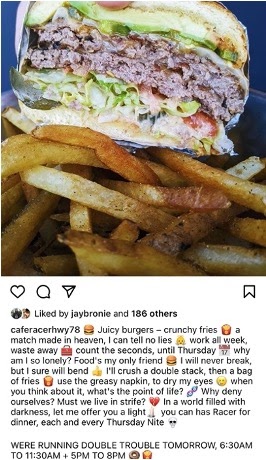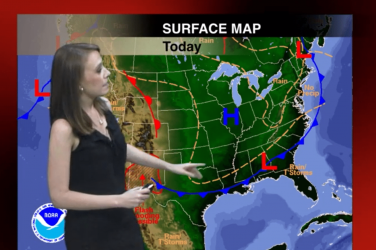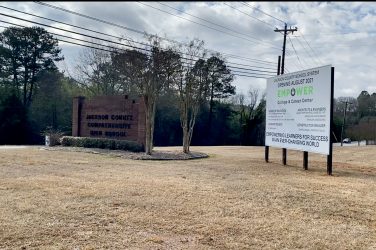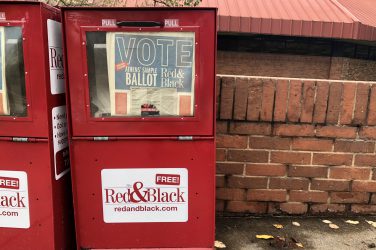At 6:20 p.m., the sun begins to set over the hills and the crickets chirp. Dust begins to stir in the gravel driveway of a shack in the middle of nowhere. The air conditioner is roaring in a futile attempt to prevent beads of sweat from protruding on the forehead of Chris Hart and his six employees. Outside a 12×12 shack, Arnoldsville Road is full of customers awaiting a taste of heaven.
Café Racer, located 11 miles outside of Athens, Georgia, is a success in an unpredictable market stemming from a captivating personality on Instagram. Chris Hart, owner of the well-known establishment, has attracted flocks of donut, biscuit, and burger lovers.
Café Racer and other Athens restaurants are using social media to reach a larger customer base that would not have discovered them otherwise. This attention, however, can have downsides that the restaurant owners are struggling to deal with.
In 2015, Hart bought a home in Crawford, Georgia. Down the road from him was a shack that had been occupied by various short-term businesses throughout the years.
After spending some time bartending at various places in Athens and redesigning a website for a hardware store, Hart’s boss at the time asked him what his next step would be.
Hart then pitched a random idea one day about redoing the shack just down the road from the house he purchased. Hart concluded that people were missing out on a good breakfast place. The traffic from Highway 78 was there and believed he could bring something new to the table.
When he opened his doors in April 2018, Hart spent the first two years lying on his back porch patiently waiting for customers.
That something new was a joke of “the bistro bros” created between Hart and his colleague Spencer Schoch.
Hart described Schoch as his best friend. They would always joke on restaurant ideas and if something was created a funny message was exchanged between “the bistro bros.”
He decided to continue with the humor by incorporating it into his business Instagram account.

Acting as if he is messaging Schoch, Hart’s “foodstagram” posts began to draw the attention of customers near and far when talking about “food being his only friend and he will never bend.”
These humorous posts drew people in from near and far, resulting in a two-hour wait on Highway 78.
Hart concluded Cafe Racer’s customer base began to grow because of the humor illustrated from his Instagram captions.
“You don’t have to do weird stuff or run seven specials a day, when we just have fun with it, people engage in it,” said Hart.
This organic humor produced more orders than the Café Racer team could keep track of. Creativity sparks demand and with demand comes high expectations, which are sometimes unrealistic.
“Part of the reason people are here is because there is hype, but hype does not mean we can put out food faster,” said Hart.
From Social to Storefront
Joe Nedza, owner of Nedza’s in Athens, experienced the same issue of high demand when he opened his doors in August 2020.
Social media facilitated Nedza’s transition from a makeshift concession stand to an established storefront.
Nedza started out his sweet shop by setting up at swim meets. When the meet was over he served waffle cones and scoops of ice cream.
This led to the opening of a food truck and the creation of his famous bubble waffle cone. The food truck would travel here and there, but never anything permanent.
After much time with the food truck, he decided in 2020 he wanted to have an establishment.
The night before its grand opening, Nedza’s lost its investors, who he said panicked because of the outbreak of COVID-19. With the uncertainties a global pandemic would bring, his investors did not want to embark on a new business.
This obstacle prevented the restaurant from maintaining the quality it boasted on social media, leaving customers disappointed by unmet expectations.
“We had to figure it out with no money, so we couldn’t really train employees in the proper way,” said Nedza.
COVID-19 gave Hart and his employees at Cafe Racer way to implement something new that would keep customers satisfied with a shorter wait time.
“Online ordering was a way for us to get the line out and people didn’t have to wait to be disappointed,” said Hart.
While 80% of Café Racer’s business is from online orders, it still does not stop customers from coming and enjoying the place to its full potential.
Anne Henley, a UGA student, posted about Café Racer on her Instagram account and caught the eye of many students at the university.
“I drive all the way out to Cafe Racer because it’s a part of the experience of eating there,” said Isabella Lathburry.
Lathburry said she enjoys driving out to the establishment with friends and hanging around on the grass to enjoy all Cafe Racer has to offer.
While each of these small businesses face challenges through the pandemic, Hart never imagined that his transparency on social media would lead to a debut on ESPN.
ESPN analyst Todd Blackledge had a taste of Cafe Racer on air early in September while in town for the UGA football game against Kentucky. Hart was already working on the idea of a second location due to high demand in his product.
Thanks to the hype he received from ESPN, Hart decided to officially announce the news that he would soon be bringing Cafe Racer to Athens.
In a day and age where social media can bring so much hurt and harm, Hart has found when he stays authentic, Instagram can only attract a loyal following but also become a restaurant’s highway to the big time.
“There is so much fluff in Instagram,” Hart said. “Because we have not done a lot of fluffy things, we have managed for our following to be really engaged.”
Hallie Turner is a student in the Grady College of Journalism and Mass Communication at the University of Georgia.








Show Comments (0)